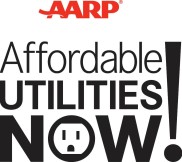AARP Eye Center

AARP SC Applauds Office of Regulatory Staff recommendationthat SCE&G terminate the Electric Weather Normalization Adjustment
AARP South Carolina applauds the report issued today by the Office of Regulatory Staff (ORS) recommends that SCE&G terminate the Electric Weather Normalization Adjustment, or eWNA, with the last billing cycle for December 2013.
As an intervener in SCE&G’s 2012 rate hike, AARP specifically questioned the validity of the weather normalization adjustment. “AARP members complained to us about the unfairness of the eWNA,” said Teresa Arnold, AARP SC state director. “We listened, we intervened, and our members were right,” she said. “We thank the ORS for their due diligence.”
Testimony filed by Ralph C. Smith, a CPA and utility regulatory consultant to AARP on October 26, 2012 in the SCE&G rate case proceeding noted that Customer inquiries and complaints about the SCE&G e-WNA tariff showing the customer reaction to the e-WNA had identified a number of concerns, including the following:
• Customers do not like the fact that the rate is constantly adjusting; the fluctuations in the monthly electric rate is perceived as electric rate instability.
• Customers perceive the e-WNA rate as being anti-conservation, citing situations where their usage has decreased but the bill increased due to e-WNA.
• Customers perceive monthly e-WNA charges that increase their electric bill as rate increases that can be substantial in a given month.
Smith had recommended that the e-WNA should be discontinued.
Among several concerns identified, the ORS found that only SCE&G can generate and verify the calculation of the eWNA factor. The temperature data used to calculate the eWNA factor is not readily available to customers, and the weather-sensitive parameters are generated through statistical regression equations that are only available through SCE&G.
“We’re happy that the Office of Regulatory Staff agrees with AARP and the majority of consumers who contacted AARP that the eWNA program should be discontinued. The program is too complicated and makes it impossible for consumers to evaluate the effects of efficiency efforts,” said Stephen Suggs, an attorney with SC Appleseed Legal Justice Center.
The ORS also expressed concern with the impact of the eWNA on customers’ conservation measures and on the Company’s DSM (energy efficiency) programs. Additionally, those customers who use gas to heat their homes are subject to a weather normalization adjustment on their electric bill, despite using gas to heat their homes. Finally, there is no filing of the eWNA mechanism with the Commission that ratepayers can view to determine how this portion of their bill is calculated.
The ORS concluded that the eWNA program lacks the attributes needed in the development of a sound rate structure. The Principles of Public Utility Rates states that the revenue-related attributes of a sound rate structure include “stability and predictability of the rates themselves” and that the practical attributes include “understandability, public acceptability and feasibility of application.”
“The best way for customers to handle extreme highs and lows on their power bill and to better plan for monthly expenses is to enroll in SCE&G’s budget billing plan,” said Arnold.























































